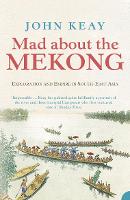


|
|
| book details |
Mad About the Mekong: Exploration and Empire in South East Asia
By (author) John Keay

|
| on special |
normal price: R 310.95
Price: R 294.95
|
| book description |
The story of both a dramatic journey retracing the historic voyage of France’s greatest 19th-century explorer up the mysterious Mekong river, and a portrait of the river and its peoples today. Any notion of sailing up the Mekong in homage to Francis Garnier has been unthinkable until now. From its delta in Vietnam up through Cambodia, Laos, Thailand, Burma and on into China, the Mekong has been a no-go river, its turbulent waters fouled by ideological barriers as formidable as its natural obstacles. But recently the political obstacles have begun to be dismantled – river traffic is reviving. John Keay describes the world of the Mekong as it is today, rehabilitating a traumatised geography while recreating the thrilling and historic voyage of Garnier in 1866. The French expedition was intended to investigate the ‘back door’ into China by outflanking the British and American conduits of commerce at Hong Kong and Shanghai. Two naval gunboats headed upriver into the green unknown, bearing crack troops, naturalists, geologists and artists. The two-year expedition’s failures and successes, and the tragedy and acrimony that marked it, make riveting reading.
| product details |

Normally shipped |
Publisher | HarperCollins Publishers
Published date | 19 Jun 2006
Language |
Format | Paperback / softback
Pages | 352
Dimensions | 198 x 129 x 26mm (L x W x H)
Weight | 230g
ISBN | 978-0-0071-1115-2
Readership Age |
BISAC | travel / special interest / adventure
| other options |
|
|
|
To view the items in your trolley please sign in.
| sign in |
|
|
|
| specials |
|
|
An epic love story with the pulse of a thriller that asks: what would you risk for a second chance at first love?
|
|

|
Mason Coile
Paperback / softback
224 pages
was: R 542.95
now: R 488.95
|
A terrifying locked-room mystery set in a remote outpost on Mars.
|
|
|
|